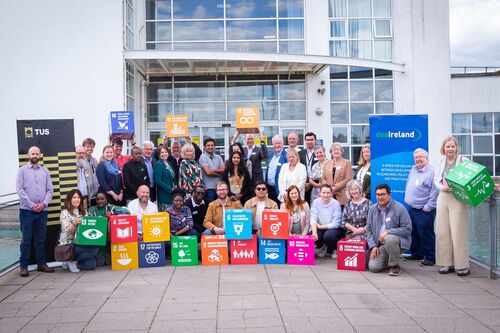
Chythenyen Nanda Kulasekaran from Dublin City University joined the 2022 DSAI Research Methods Summer School and says, among other things, it helped add more depth to his dissertation. Here he shares a short summary of the Summer School.
The two-day hybrid event, hosted and held on May 31st and June 1st, 2022 in partnership with TUS Thurles, provided participants with critical skills for conducting research on sustainable development. The first day of the workshop was conducted online and provided participants with a solid foundation for understanding the United Nations Sustainable Development Goals.
Dr.Mark Garavan of Atlantic Technological University dwelled deep into the different meanings of the words "development" and "sustainability," prompting participants to "research" and "measure" sustainability from the perspectives of local lives.
This was followed by sessions led by experts from the respective fields to educate participants on individual SDG goals such as gender equality, food and nutrition, and poverty. Following lunch, the panel discussions were divided into two broad themes: gender and water. After selecting the water panel, I understood the inherent interconnections between water and climate change.
You can find the Programme detail with links to the recorded sessions here.
The second day of the workshop, which was "live and in-person," began with the formation of new and meaningful friendships at the Thurles railway station. The short walk from the station to the venue helped me connect with some of the participants and served as a constant reminder of the importance of face-to-face events in light of covid constraints.



In the first session of the day, Cliffard Guest of TUS explained the significance of the Stockholm resilience institute's "wedding cake" model very well. The model illustrated a new way of looking at each goal and prioritized the goals focusing on the biosphere, within which the goals focusing on the economy and society sit. The biosphere layer of the wedding cake paradigm has the SDGs no 6, 13,14 and 15 targeting water, climate action, life below water and life on land. Above this sits the social layer consisting of goals no 1,2,3,4,5,7,11 and 16 targeting poverty, hunger, education, gender equality, peace and justice among others. The economic layer that is above the social layer, consists of the goals targeting economic growth and inequalities, industrial production, infrastructure and innovation which are represented by the goals no 8,9,10 and 12. Finally the top layer consists of goal 17 regarding partnerships which transcends all the three layers of the cake. Thus, the wedding cake model of SDGs, promotes a more "ecocentric" view of the world.
The breakout sessions during the second half of the day, provided an excellent peer-to-peer learning experience, and each group's findings were presented at the conference. Some suggestions for strengthening the SDGs included localizing them, taking a more holistic approach on SDGs when planning development initiatives, and making them more culturally appropriate. The closing remarks by Dr. Catherine Corcoran of TUS and Dr. Nita Mishra, Chairperson of DSAI, sparked conversations and discussions about the application of SDGs to research practice.



Some 90 people from across the DSAI network of academics, students and those working in NGO, CSO and and government bodeies participated in the 2022 Summer School. Feedback from other participants universally found the event useful, most valued aspects being the excellent quality and expertise of the speakers and the opportunity for information sharing. When asked what planned actions they had as a result of the summer school, over 70% of respondents planned actions to better consider and integrate the SDGs into their research, methods or workplans.
Participant Keitumetse Mabole says,
"I really enjoyed the theme of this year's summer school. The concept of sustainable development is the chief cornerstone of my research project. I have fitted well in this theme and I have picked a lot of ideas that I will integrate into my professional work as well as my research project. The event has really elevated my level of critical thinking."
Those wanting to continue the dialogue will be interested to note that the DSAI Annual Conference Theme for 2022 is 'Critical perspectives on Sustainable Development'. More information about the conference can be found here. A call for papers and posters dealing with all fields and aspects of development is open until September 2022 - read more here.